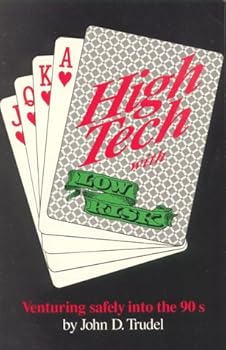High Tech With Low Risk (Venturing Safely into the 90s)
This is a quick read on how to increase your growth and profits through knowledge-based business ventures. It can help you compete more effectively in today's markets, if you are willing to invest and... This description may be from another edition of this product.
Format:Paperback
Language:English
ISBN:0962677221
ISBN13:9780962677229
Release Date:January 1990
Publisher:Trudel Group
Length:195 Pages
Weight:0.65 lbs.
Customer Reviews
2 ratings
Limit Your Startup Risks
Published by Thriftbooks.com User , 20 years ago
The past thirty years has seen a worldwide explosion in the creation and marketing of high-technology products. Huge fortunes have been made -- but many ventures have also failed. The author, John Trudel, has been intimately involved with this product explosion. As a technologist and as a high-technology business-development consultant, he has played a key role in close to $1 billion of product successes. His basic premise is that many forget or ignore that "people are the critical resource for knowledge-business...". Another basic error is that high-tech inventors often fall in love with their inventions -- in fact, even more so than with low-tech inventions. They then fail to realize that the invention and the prototype are perhaps 20 percent of their business venture. They do not grasp that the same "knowledge, skill and intuition" that creates a product must by applied to production, sales and marketing. Note that this caution applies not only to individuals but to the biggest of the big. The author asks where are the early leaders in transistors (RCA, GE, Tungsol, etc.) in the integrated circuit field? Another basic rule that he urges you to observe is "To keep it small and quick!". This book is packed with examples of companies that have violated this rule. He describes and highly recommends the "skunk works" approach made famous by Lockheed. Too often even the most experienced firms seem to think a large budget and a vast staff will get project results better and faster. Trudel feels that marketing is a very big weakness in many U.S. technology firms. He stresses that sales and marketing are not the same thing. "Sales is inducing someone to buy..." -- but "marketing is identifying a need and filling it profitably...". Just talking to customers is not marketing. "Intuitive understanding" is a key factor. You must listen and understand the customers' needs. The book is loaded with boxed quotations that drive home points. For example, "If Edison had been an MBA, he would have invented a large candle: -- Anon. (I counted about thirty quotes -- many worth tacking up on your wall.) He describes the classic FUD strategy used by IBM and which your competitors may well employ. Their salespeople will present to your potential customers certain questions about your company and your new product that will excite Fear, Uncertainty and Doubt, Be aware of this sales technique or you may find yourself "FUDed" one day. The blind love of one's invention affects not only individual inventors but often large corporations. Trudel describes how one such corporation failed to see that their cute device simply was not useful to their customers. Whether one calls it love of product, technical arrogance or pseudo-marketing, the results are a great waste of time, money and resources. He notes the kaisen, the Japanese concept of continuous product improvement, has become a fact of life in today's manufacturing world. Ignore it and the world will soon ignore y
Fills a void. Outstanding on small teams. Good examples.
Published by Thriftbooks.com User , 29 years ago
Still available! This one is a sleeper. How to makemoney from technology. Lot's of hands-on examples from a practical,seasoned Management Consultant.





